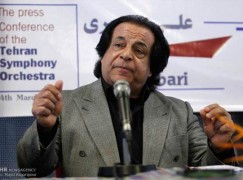Iran rejects music director’s resignation
mainOur informant in Teheran says the Iranian authorities have refused to accept Ali (Alexander) Rahbari’s resignation from the Tehran Symphony Orchestra.
In his resignation letter, Ali write: ‘Despite incorrect reports in the media, the players’ salaries were not paid completely and they do not have contracts for the future.
‘I have tolerated all these problems but I have no hope for collaborating with this unprofessional (Rudaki) foundation (through which the orchestra is funded). Therefore, I prefer to hand in my resignation and open the way for the musicians to find another organization with which to continue their careers.’
The Government now has a week to meet his reforms, or accept his resignation.






Comments